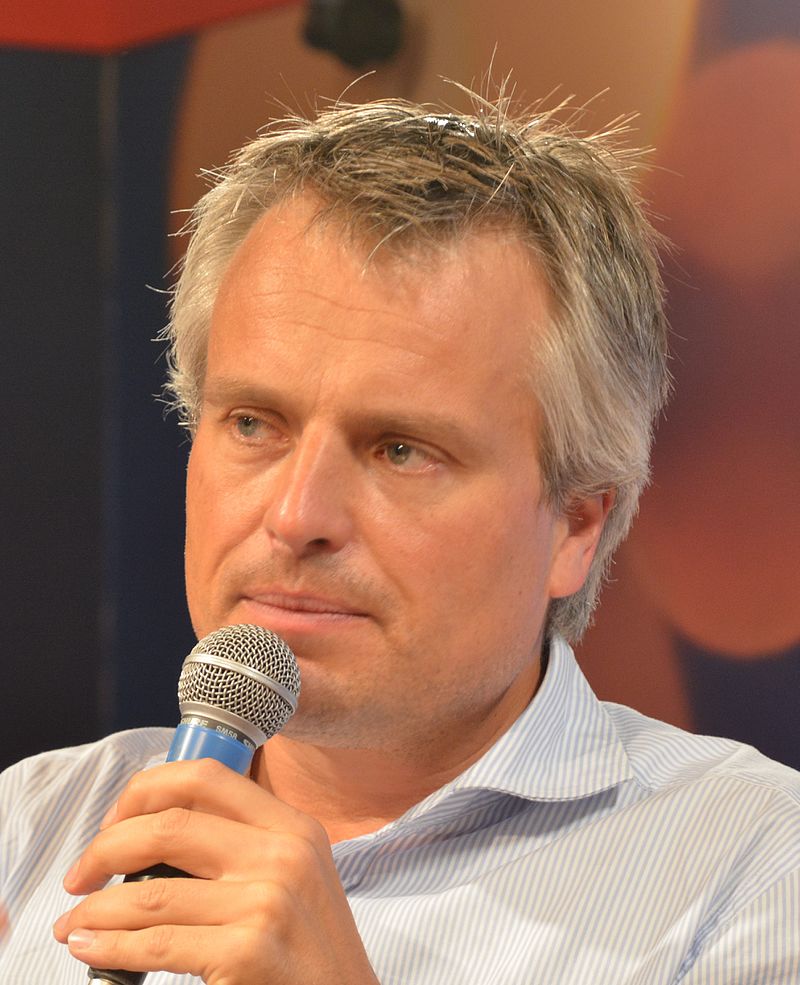Written by: Ruben Dieleman (Swedish translation by Anna Lindvall)
Innan bankkrisen bröt ut år 2008 visste den nederländska journalisten och antropologen Joris Luyendijk “ingenting om finanssektorn, förutom att den var väldigt viktig”. Det som hände på börsmarknaden sköttes troligtvis av kvalificerade och kunniga ekonomer – så tänkte han då. Med krisen växte hans nyfikenhet och han bestämde sig för att spendera fem år med banktjänstemännen i London för att försöka begripa finansvärldens alla nyanser och nycker. Resultatet av hans forskning heter ”Simma med hajar”. Boken har blivit översatt till flera språk, sedan den publicerades år 2015. Luyendijk närvarade på Bokmässan i Göteborg för att tala om sin bok och delta i seminarier.
”Jag upptäcker ständigt luckor i min kunskap och försöker sedan utforska dem så mycket som möjligt” – Joris Luyendijk
Efter fem år förstod sig Luyendijk fortfarande inte helt på finansmarknaden. ”Sektorn är helt enkelt för stor för det. Den kräver ett språk som jag fortfarande inte helt kan behärska. När jag började min undersökning visste jag ungefär lika mycket om finanser som vilken människa som helst: ingenting. De flesta nyhetsläsare vill inte erkänna det, men de hoppar över ekonomidelen för att de inte förstår innehållet. Jag brukade också göra det. Mitt antagande att finanssektorn hanterades väl motbevisades under 2008. Konsekvenserna av det som hände då känner vi fortfarande av idag. Men det beteende och besluten som ledde fram till krisen har inte straffats än.”
Enligt Luyendijk borde banktjänstemännen bli kontrollerade på samma sätt som alla andra, på grund av riskerna de har tagit och skadan som de har orsakat världen. Hur de har kunnat komma undan med sina brott övergår hans förstånd. Hans annars lugna och diskreta röst brusar upp och trots att han är trött – ”jag sov knappt i natt” – blir han uppriktigt passionerad och arg när han pratar om misskötseln han upptäckte i London. ”Moralen måste återvända till börsmarknaden.” Luyendijk har inte sett någon förändring sedan kraschen. “Åtgärderna som togs efter krisen var bra, men långt ifrån tillräckliga”.
Nyligen skrev Luyendijk om Brexits potentiella effekter på Europa och på Nederländerna i synnerhet. Han följde utvecklingen med en viss skadeglädje: “Britterna kommer behöva skriva om hundratals lagar de kommande 20 åren. De kommer behöva omdefiniera sin roll i Europa nu, det var det som folket ville. Det kommer bli en smärtsam, svår process för dem. Men det öppnar också upp andra möjligheter, åtminstone för resten av EU. Britterna har alltid varit översittare i Europeiska Unionen. De har blockerat viktiga policybeslut och reformer, de har dessutom alltid drivits av sina egenintressen utan någon större hänsyn till kontinenten. Jag kan bara gratulera att de på eget bevåg går ur unionen nu. För de länder som faktiskt behöver unionen och som har integrerat sig med sina grannländer under flera årtionden, kan detta vara en fördel.”
Samma gäller för Sverige, enligt den bästsäljande nederländska författaren. Men det finns en avigsida. “Sverige har valt att inte sitta vid bordet där alla beslut tas. De har fortfarande sin egen valuta. Att stå utanför eurosamarbetet var kanske inte en bra idé för Sverige. För Nederländerna är det annorlunda. Alltid varit annorlunda, faktiskt. Den holländska valutan var bunden till den tyska D-marken i över ett decennium. För närvarande delar Nederländerna armén, flottan, lagar, förordningar och stora delar av sin ekonomi med Belgien och Tyskland. Från detta perspektiv är risken för en Nexit liten.”
Samtidigt sköljer anti-EU-känslor över kontinenten, av exakt den sorten som gjorde Brexit möjligt och som känns av i både Nederländerna och Sverige. Framtidstron på EU har minskat kraftigt sedan Lissabonfördraget trädde i kraft. Hur otroligt det än verkar, ska risken för att ännu ett land träder ur EU inte underskattas. Luyendijk kommenterar: ”Så som unionen fungerar just nu är definitivt problematiskt. Om Europas regeringar inte lyckas råda bot på den misskötsel inom EU och missnöje som människor med all rätt känner gentemot unionen, om förändring och rättvisa endast kan uppnås genom att lämna samarbetet, då skulle jag också föredra en sådan utväg. Men jag är inte övertygad om detta än.”
Den oro som märks av i Luyendijks kommentarer ger intrycket av att en apokalyptisk situation är nära. Hur påverkar det författaren själv? ”När jag var korrespondent i Mellanöstern fick jag uppleva många skrämmande situationer. I London kände jag en annan slags skrämmande kyla. Men hoppet, ja, det dör sist”, säger han leende.
ENGLISH:
Joris Luyendijk: “Opting out of the Euro may not have been such a great idea for Sweden”
Before the 2008 banking crisis, Dutch journalist and anthropologist Joris Luyendijk “knew nothing of the financial sector, other than that it was very important”. Whatever happened on the stock market trade floors was probably done by qualified people, or so he thought. When the crisis hit, his curiosity sparked, and he set out to spend 5 years in the City of London among bankers, to try and grasp the world of finance. The product of his research is called ‘Swimming with sharks’, which came out in 2015 and has been printed in several languages. Luyendijk was present on Göteborgs Bokmässa to talk about his book and to provide seminars on various topics.
“I discover holes in my knowledge and subsequently try to find out as much as possible about them.” – Joris Luyendijk
After 5 years, the Dutchman still does not fully understand finance. “The sector is just too big for that. It requires learning a language that I still have not fully mastered. When I started my investigation, I knew as much about it as the average person: nothing. Most newspaper-reading people will not admit it, but they skip the financial segment of the paper because they do not understand. I used to do that as well. My assumption that the financial sector was well taken care of proved wrong in 2008. The consequences of what happened then are still felt today. But the conduct that lies at the foundation of the crisis is yet to be punished properly.”
According to Luyendijk, bankers will have to be disciplined in the same way as anybody else, for the risks that they have taken and the damage they have done to the world. Why bankers keep on getting away with their crimes is beyond him. His voice, calm and low by default, sweeps up, and even though he is tired – “I hardly slept last night” – he becomes genuinely passionate and visibly angry when talking about the malpractices he saw in The City. “Morality has to return to the stock exchange.” Luyendijk has not seen much change since the crash. “The measures that have been taken are good, but far from sufficient.”
Recently, Luyendijk wrote about the impacts the Brexit might have on Europe and the Netherlands in particular. He followed the developments with a certain kind of schadenfreude: “The British will have to rewrite countless laws of the course of the next 20 years. Essentially, they will have to reinvent themselves because the people willed it. That will be a painful, difficult process for them. But it opens up some opportunities, for the rest of the EU at least: The Brits have always been the bullies of the European Union. They have blocked crucial policies and reforms, and they have always pursued their own interest without any consideration for the continent. I can only applaud that they step out of the union by themselves now. For countries that need the union and that have de facto been weaved into their neighbouring countries for decades, it can be beneficial.”
The same goes for Sweden, according to the bestselling Dutch author. But there is a downside. “Sweden has chosen not to sit at the table where all the decisions are made. They still have their own currency. Opting out of the Euro may not have been such a great idea for Sweden. For the Netherlands, where I come from, this is different. Always been actually. The guilder was bound to the Deutsche Mark for more than a century. Currently, the Netherlands shares its army and navy, laws, permits and economy with Belgium and Germany. From this point of view, the likelihood of a Nexit seems small.”
Meanwhile, however, an anti-EU sentiment is sweeping the continent. Exactly the kind that made the Brexit possible, and is looming over both the Netherlands and Sweden. The belief in a future for the union has decreased significantly since the inception of the Treaty of Lisbon. As insensible an idea it may seem, the chance of another exit should not be underestimated. Luyendijk agrees: “The way the union currently function is absolutely problematic. And if the governmental bodies fail to react to the legitimate discontent and mismanagements within the union, if change and justice can only be reached by ways of a departure, then I myself would prefer an exit, too. I am still not convinced of this, however.”
The urgency that Luyendijk puts in his words and work, gives one the impression that apocalyptic scenarios are at hand. How does it affect the author himself? “When I was stationed in the Middle East as a correspondent, I saw many daunting scenes. In London, I experienced another kind of disheartening prospect. But hope, well, hope dies last”, he smirks.





